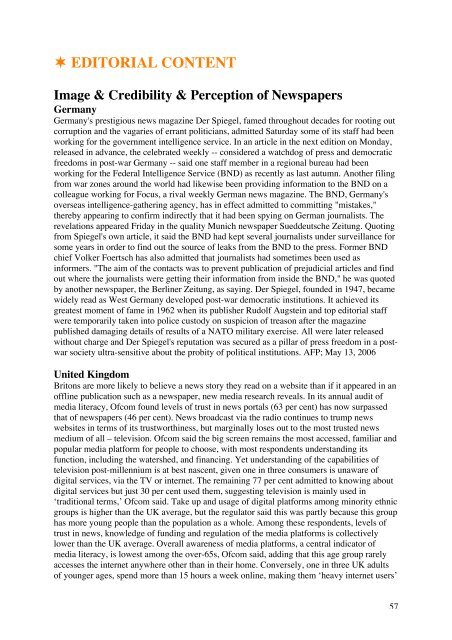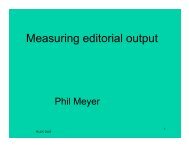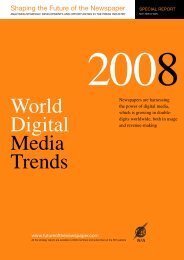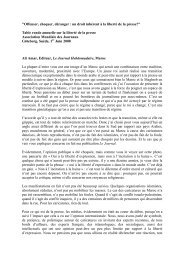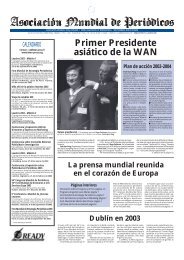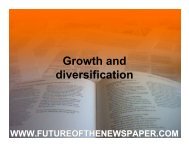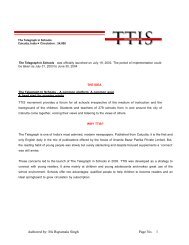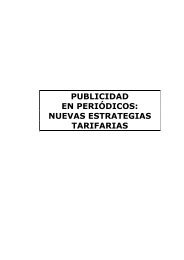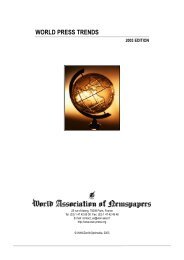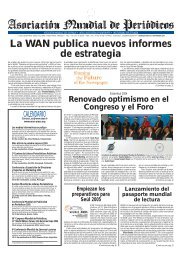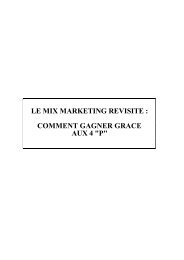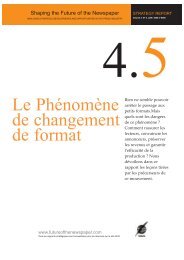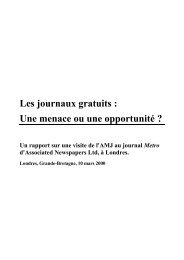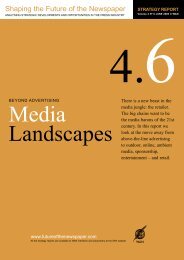MEDIA MARKET DATA - World Association of Newspapers
MEDIA MARKET DATA - World Association of Newspapers
MEDIA MARKET DATA - World Association of Newspapers
You also want an ePaper? Increase the reach of your titles
YUMPU automatically turns print PDFs into web optimized ePapers that Google loves.
EDITORIAL CONTENTImage & Credibility & Perception <strong>of</strong> <strong>Newspapers</strong>GermanyGermany's prestigious news magazine Der Spiegel, famed throughout decades for rooting outcorruption and the vagaries <strong>of</strong> errant politicians, admitted Saturday some <strong>of</strong> its staff had beenworking for the government intelligence service. In an article in the next edition on Monday,released in advance, the celebrated weekly -- considered a watchdog <strong>of</strong> press and democraticfreedoms in post-war Germany -- said one staff member in a regional bureau had beenworking for the Federal Intelligence Service (BND) as recently as last autumn. Another filingfrom war zones around the world had likewise been providing information to the BND on acolleague working for Focus, a rival weekly German news magazine. The BND, Germany'soverseas intelligence-gathering agency, has in effect admitted to committing "mistakes,"thereby appearing to confirm indirectly that it had been spying on German journalists. Therevelations appeared Friday in the quality Munich newspaper Sueddeutsche Zeitung. Quotingfrom Spiegel's own article, it said the BND had kept several journalists under surveillance forsome years in order to find out the source <strong>of</strong> leaks from the BND to the press. Former BNDchief Volker Foertsch has also admitted that journalists had sometimes been used asinformers. "The aim <strong>of</strong> the contacts was to prevent publication <strong>of</strong> prejudicial articles and findout where the journalists were getting their information from inside the BND," he was quotedby another newspaper, the Berliner Zeitung, as saying. Der Spiegel, founded in 1947, becamewidely read as West Germany developed post-war democratic institutions. It achieved itsgreatest moment <strong>of</strong> fame in 1962 when its publisher Rudolf Augstein and top editorial staffwere temporarily taken into police custody on suspicion <strong>of</strong> treason after the magazinepublished damaging details <strong>of</strong> results <strong>of</strong> a NATO military exercise. All were later releasedwithout charge and Der Spiegel's reputation was secured as a pillar <strong>of</strong> press freedom in a postwarsociety ultra-sensitive about the probity <strong>of</strong> political institutions. AFP; May 13, 2006United KingdomBritons are more likely to believe a news story they read on a website than if it appeared in an<strong>of</strong>fline publication such as a newspaper, new media research reveals. In its annual audit <strong>of</strong>media literacy, Ofcom found levels <strong>of</strong> trust in news portals (63 per cent) has now surpassedthat <strong>of</strong> newspapers (46 per cent). News broadcast via the radio continues to trump newswebsites in terms <strong>of</strong> its trustworthiness, but marginally loses out to the most trusted newsmedium <strong>of</strong> all – television. Ofcom said the big screen remains the most accessed, familiar andpopular media platform for people to choose, with most respondents understanding itsfunction, including the watershed, and financing. Yet understanding <strong>of</strong> the capabilities <strong>of</strong>television post-millennium is at best nascent, given one in three consumers is unaware <strong>of</strong>digital services, via the TV or internet. The remaining 77 per cent admitted to knowing aboutdigital services but just 30 per cent used them, suggesting television is mainly used in‘traditional terms,’ Ofcom said. Take up and usage <strong>of</strong> digital platforms among minority ethnicgroups is higher than the UK average, but the regulator said this was partly because this grouphas more young people than the population as a whole. Among these respondents, levels <strong>of</strong>trust in news, knowledge <strong>of</strong> funding and regulation <strong>of</strong> the media platforms is collectivelylower than the UK average. Overall awareness <strong>of</strong> media platforms, a central indicator <strong>of</strong>media literacy, is lowest among the over-65s, Ofcom said, adding that this age group rarelyaccesses the internet anywhere other than in their home. Conversely, one in three UK adults<strong>of</strong> younger ages, spend more than 15 hours a week online, making them ‘heavy internet users’57


